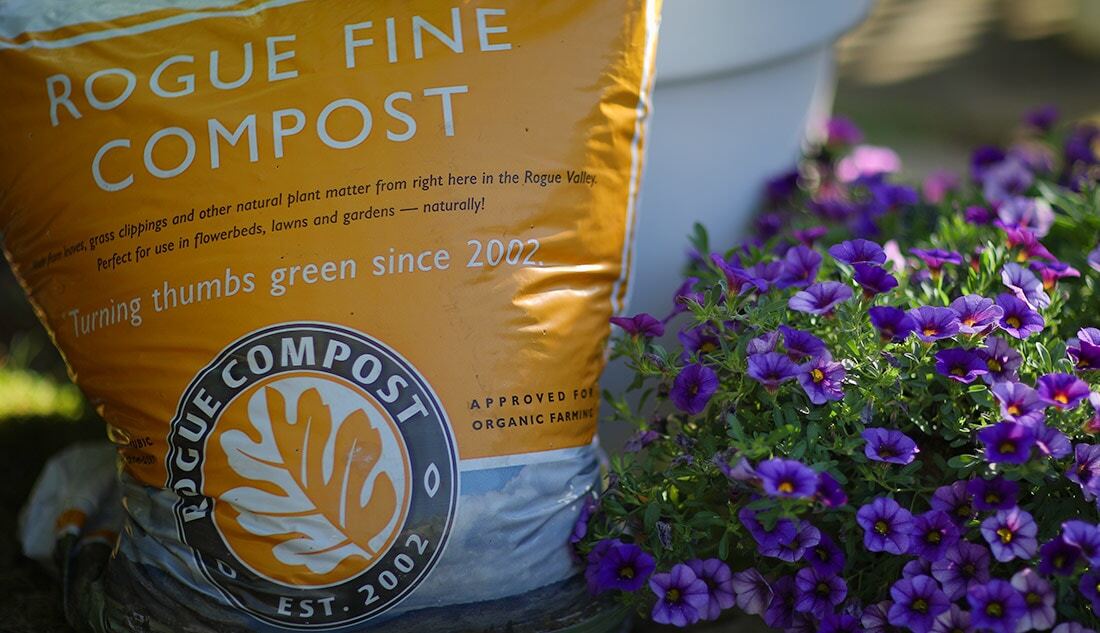Spring seems to be the time my yard is overrun by bugs and insects. I don’t want to use chemicals. Are there other options?

Absolutely! There are all kinds of ways to control harmful garden bugs, with no chemicals required. Here are a few good suggestions.
1. Start with good soil
The kind of soil you have can actually help deter garden pests. Tilling in organic matter when the growing season begins — like Rogue Compost — will help keep your soil clean by adding natural elements and compounds that keep pests away.
2. Keep weeds in check
Not only do weeds compete with your other plants for water, nutrients and light, but they can also be home to garden insect pests and parasites. So be sure to pull weeds when you see them and do your best to get their roots completely out so they won’t grow back.
3. Clean up hiding places for slugs
Spring is the time when slug eggs hatch and hundreds of nature’s slimiest creatures come out to wreak havoc in your garden. Slugs look for areas that are warm and damp. They’re particularly fond of lettuce and other salad greens, beans, strawberries, primroses and daffodils. They will crawl underneath anything where the environment is dark and moist — including loose stepping stones and pavers, bricks, pots, and loose debris in your yard.
So start by cleaning up your yard. Raise pots off the ground using “pot feet.” Make sure mulch is several inches back from plant foliage. And water in the morning (see #6 below) as plants can absorb that water throughout the day — eliminating damp plants at night.
As for getting rid of these slimy pests, here are some options:
- Attract natural predators, such as frogs, ground beetles and garden snakes
- Armed with a flashlight or head lamp, go out at night (when slugs are hungry and most likely to be out), pick them up by gloved hand, and drop them in a bucket of soapy water
- Put out beer traps. Slugs are attracted to the yeasty odor found in beer. They like it so much that they will crawl into containers filled with beer and drown — gross, but effective. To create your trap, use a margarine container with a lid. Cut holes near the top of the container… the slugs will use these holes to access the trap. Bury the containers in the ground with about an inch left above the soil line — this prevents beneficial bugs from falling into the traps. Fill it with beer. Remove dead slugs each day, then refill with beer and repeat. Keep in mind that this will only attract slugs within a limited range, so the more traps the better.
4. Remove dead leaves
Bugs like dead and diseased foliage. So when you see dead leaves on your plants, trim them off. This will stop the entire plant from becoming contaminated and will help thwart insect pests.
5. Introduce beneficial insects
Nature has given us a variety of insects that do the dirty work for you, keeping harmful bugs at bay. Ladybugs, for example, eat aphids and mites, as well as the eggs and larvae of many destructive insects. Praying mantises, lacewings, and parasitic wasps are also beneficial for taking care of insect pests. You can find these beneficial garden bugs at many horticultural supply companies
6. Water your plants in the morning
Watering plants in the early morning helps them maximize photosynthesis, which occurs during daylight hours. If you water later in the day or in the evening, the leaves will be damp during the cooler nighttime hours — prime conditions for promoting fungus, rot and other diseases. Another way to help bug-proof your leaves is to soak the plant’s roots, rather than getting the foliage wet. Soaker hoses and drip systems can be a great way to go.
7. Keep your garden clean
Decaying plant matter is a breeding ground for garden bugs, fungus and plant diseases. Avoid this by removing faded blooms, dead and fallen leaves, and weeds whenever you see them.
8. Try crop rotation
Crop rotation is the large-scale farming practice of growing different types of crops — or plants — in the same area each season as a way to help with nutrient retention and pest control. The same thing happens in your garden. If you grow the same plants in the same place each year, the bugs that use those plants to survive will remain in the area, waiting for the next “crop.” So mix it up! Try planting beans (which add nitrogen to the soil) where you previously planted tomatoes (which take nitrogen from the soil) as a way to keep your garden healthy.
Share This
